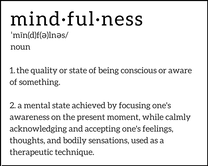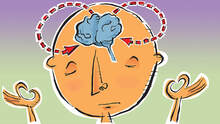

Mindfulness is not meditation. Meditation is a very useful means of practising and strengthening mindfulness, but there are many other ways to practice it. Mindfulness is about how you do things rather than what what you're doing. It's a process of directing your attention to the present moment in a non-reactive way. This includes your physical, mental, and emotional experiences.
Just imagine you take a glass of water and swish it around. To stop the water swirling, you do not swish the other way but put the glass down and wait. It is often useful to approach the thoughts and feelings that can swirl through our brain in the same way. Noticing them and gently letting them be is mindfulness.

Practising mindfulness has been demonstrated to reduce anxiety, stress, and depression, improve well-being and even enhance clear thinking. Mindfulness has such widespread benefits because it affects so many different neural circuits in the brain, including the prefrontal cortex, anterior cingulate cortex, insula and striatum. This leads to increased emotional regulation, impulse control, and awareness of the present moment.
- Mindfulness reduces emotional reactivity. Simply becoming aware of your emotions may allow the prefrontal cortex to calm the amygdala's automatic reactivity. With practice, the prefrontal cortex gets better at soothing the amygdala, reducing the intensity of overwhelming emotions.
- Mindfulness strengthens reward circuits. Our brain tends to swing between excitement and disappointment. These swings create the potential for a downward mood spiral, but mindfulness training helps smooth out those jagged swings.
- Mindfulness elevates mood. Mindfulness training has been shown to improve mood and reduce depressive symptoms. A large analysis of several studies found that mindfulness-based interventions are just as effective as other forms of treatment for depression.
- Mindfulness reduces stress and has measurable effects on heart rate, blood pressure, mood, and anxiety. This illustrates how the mind and attention can influence your body. Being more mindful can lead to a reduction of the stress hormone cortisol in stressful situations.
- Mindfulness has been shown to help change bad habits like smoking and other addictions. Bad habits tend to be almost involuntary, with the urge to act followed automatically by the action. Mindfulness helps to create a space where we can respond rather than react, and choose to replace bad habits with more intentional actions.
- Mindfulness training improves clear thinking and even mental performance on difficult tests. The effect is strongest for the people who are the most distractible at the start.
- Mindfulness training has been shown to greatly decrease the chance of relapse in depression. This effect is strongest in people with the worst depression. So if you're climbing out of depression, mindfulness can help keep you from sliding back.

These are some of the misconceptions that lead to confusion when you start a mindfulness practice. Mindfulness is not clearing your mind of all thoughts and feelings. You cannot control your automatic thoughts and feelings, and it is not worth trying to. Mindfulness may lead to a quietening of your thoughts, but you can't force that to happen. You simply have to allow it to happen.
- Mindfulness is not relaxation. It is often relaxing, but that's not the goal. Relaxation is also helpful, but it benefits you in a different way from mindfulness.
- Mindfulness is not about suppressing your feelings. It's about becoming aware of the things you're feeling instead of trying to change or ignore them. This can be uncomfortable at time.
- Mindfulness is not positive thinking. Focusing on the positive aspects of reality has many benefits for mood and stress, but those are distinct from mindfulness. Mindfulness helps to create a space to help replace bad habits with more intentional actions.
- Mindfulness is not wallowing or ruminating. Mindfulness is about immersing yourself in the present moment while wallowing and ruminating focus on past mistakes and how they'll continue to haunt you into the future. Mindfulness includes noticing the brain's judgmental thoughts but without getting carried away by them.

MBSR is a mindfulness course that has been heavily researched and has a strong evidence My next course begins on Tuesday Feb 16 on Zoom. Book through www,headrest.com.au or call me for more info, Tienne 0431842950. I'm an accredited and experienced teacher and mental health professional.

 RSS Feed
RSS Feed
